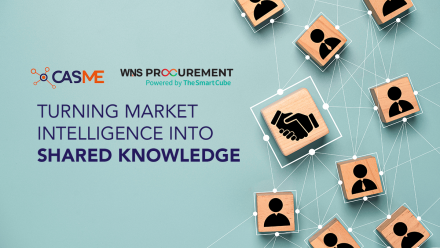
Jim Green is the General Manager of Strategic Procurement at John Holland, a large engineering and construction company in Australia. He has extensive project management, commercial, contracts and procurement management experience gained over the last twenty-plus years, during which time he has successfully delivered projects in the oil and gas, water, building and mining industries.
CASME spoke to Jim ahead of ProcureCon Australia, taking place in Sydney from 14-15 May, where he will be one of the speakers.
Can you tell us a little about yourself?
I sometimes think of myself as a gypsy with a laptop. I was born in the UK and grew up in rural Australia. Over the last 20 years I have worked across the world, from Scotland, the USA, Korea, Vietnam, and Mongolia, ending up back in Australia, where I am now based. I have enjoyed and learned much about different cultures and ways of working. These experiences have allowed me to apply different lenses to different situations, and to find simple solutions to difficult problems.
Can you tell us about your involvement with the Supply Chain Sustainability School?
My company, John Holland, is also a founding fellow of the Supply Chain Sustainability School and I became involved as part of my responsibilities in social and indigenous procurement. The School’s remit fits squarely within my belief that social and indigenous procurement and engagement is not charity; but when managed properly with the right attitude, is an efficient way of spending money.
Launched in 2012, the Supply Chain Sustainability School is a no-charge online learning platform for sustainability, with the aim of upskilling those working within, or aspiring to work within, the construction sector.
Fellows benefit from education tailored to their supply chains, so it is a win-win for both. For the John Holland organisation, it gains content for projects, e.g. website landing pages that enhance the skills of its supply chain, and it also helps the company to better understand and report on their sustainable practices. Often, small and medium-sized enterprises (SMEs) engage in sustainable practices, but they might not be familiar with government terminology or reporting methods. Access to the Supply Chain School of Sustainability means they can still benefit from the free educational resources being offered.
You’re speaking at ProcureCon Australia about the evolving trends and expanding technology landscape in Asia, and the key innovations that can be adopted for sustained competitiveness. What are your perspectives in this area?
There are obviously many key innovations in the technology landscape; yet the real innovation is not in the code and apps, but how these work with people. People are the centre of our business. Modernising and streamlining encourages incremental gains and relationships, and innovation drives the quantum changes.
At John Holland, we are currently in the process of modernising our procurement platforms and are probably 50% of the way through the programme. By implementing a modern procurement system, I am expecting to drive substantial efficiency gains in the number of hours it takes us to do our procurement, and we should be able to save a couple of percentage points in staffing costs. This is quite a simple thing to measure and can be used to build the business case for the transformation.
However, the real power lies in other areas.
The analytics and understanding of the supply chain will allow better understanding of what, how, and when we buy, from whom, and this will give us far better market intelligence.
The most important thing that structured data, efficiency and market intelligence will give us, is the ability to communicate with our supply chain better. Planning and tailoring this communication to ensure that our supply chain is informed and collaborated with at the correct time and level will create more trust, enable innovation, and therefore drive value.
For this to be effective, several components must be in place. However, a modern procurement system based on a collaborative platform is essential, as it will provide the necessary foundation for this to occur.
Artificial Intelligence (AI) is a buzzword and is here. I use Microsoft Copilot for all sorts of things. It won’t replace us, but hopefully it will do our repetitive tasks and give me more thinking time.
We recently ran a proof of concept on a business-wide operational system. It took one year and was a resounding success, but we opted not to implement the system. How do I know it was a success and we made the correct decision?
- I still have my job.
- The team stayed and helped pivot the strategy. We reloaded and started again.
- The executive team endorsed our decision and kept funding the revised strategy.
My advice is therefore don’t be afraid to fail – call it early, but be sure it is a failure. It’s far better to change strategy or technology partner, than continue on a path doomed to failure.
What are you looking forward to seeing at ProcureCon Australia this year?
Quite simply, it’s the opportunity to meet people face-to-face. To chat with fellow attendees, learn about their experiences and pick up tips which I can then use to level-up my own game.
And finally, what do you like doing when you’re not working?
My favourite past time is probably fishing. It is cross-cultural and I have done it everywhere I have lived. And I do enjoy BBQ cuisine - both Korean and Texan.
ProcureCon Australia takes place at the Hilton Sydney, Australia from 14-15 May 2024 and includes inspirational keynotes, small-group interactive learning sessions and peer-to-peer networking. Procurement practitioners gain a 15% discount when registering using the code CASMEAUS15. Register now.
Back to News



